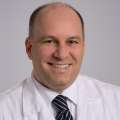Sleep Disorders
Sleep research at UCLA is multidisciplinary, and includes faculty from the NeuroPsychiatric Institute, Brain Research Institute, Department of Medicine, Department of Head and Neck Surgery and the School of Dentistry. Our research focuses on brain processes which lead to sleep-disordered breathing in children and adults, on sleep and breathing-induced immune action which result in memory and emotional disorders, and on the underlying brain pathology in narcolepsy. Another focus rests on determining the genetic and neural processes controlling circadian influences on behavior. Considerable effort is devoted to ascertaining the brain mechanisms leading to disturbed breathing, blood pressure, heart rate, and signs of depression in heart failure patients; such patients show a high incidence of sleep-related pathology. The research includes adults and children who show airway obstruction during sleep (obstructive sleep apnea), as well as pediatric patients who completely cease breathing during sleep as a consequence of a genetic mutation. Many of these studies use imaging of the brain to determine brain structure and action of particular brain areas during conditions which simulate what occurs during sleep. Other studies evaluate markers of injury from immune action occurring during adverse sleep behaviors. Both approaches have shown signs of injury, with the imaging research demonstrating damage in brain areas that serve memory, cognition, and emotion in both children and adults. Additional studies examine neurotransmitter action on brain processes underlying the collapse of muscle action in narcolepsy. Cardiovascular studies evaluate the role of simple food additives to enhance neuro-protection against cardiac arrhythmia during sleep in epilepsy. Still other research evaluates cerebral blood flow and velocity in heart failure and sleep apnea patients, and relates those brain perfusion measures to the brain injury found in the syndromes. Several studies assess cognitive and emotional behavior in relation to brain injury in sleep apnea and heart failure patients; over half of heart failure patients show sleep-disordered breathing. Finally, collaborative research with the Cousins Center for Psychoneuroimmunology at the UCLA Semel Institute for Neuroscience examines the health consequences of chronic insomnia with the development of complementary and behavioral interventions for older adults and for persons with chronic disease (e.g., rheumatoid arthritis, cancer). The research is performed in the clinical laboratories, in the General Clinical Research Center sleep laboratory, multiple imaging resources in the Brain Mapping Division and the Center for Magnetic Resonance Imaging, and multiple laboratories of the Brain Research Institute.
Additional work by faculty at the Comprehensive UCLA Sleep Disorders program is in the development of sleep educational tools for physicians. Examples include two guest edited issues of Seminars in Neurology on Sleep, a Handbook of Sleep Medicine, and a board review textbook, Review of Sleep Medicine. Faculty in the center have expertise in sleep disorders in the older person and the use of hypnotic agents in this cohort. Clinical faculty in the program have interests in the management of insomnia, sleep disordered breathing, restless legs syndrome, circadian rhythm disorders, and hypersomnia.
To make an appointment for a Sleep Clinic visit at UCLA: Your physician should fax the Neurology Consultation Form to 310-794-7491. Once the form has been faxed, you should contact our office at to schedule the appointment. You will need to have your patient registration ID number ready.
To make an appointment for a Sleep study (polysomnogram) at UCLA: Your physician will need to see you in clinic and send a request for a sleep study (polysomnogram) to the UCLA Sleep Laboratories.
Contact Information:
Phone:
Fax: 310-267-1062
E-mail:
Director
Giving: Your gift to the UCLA Sleep Disorders Program makes a difference.
